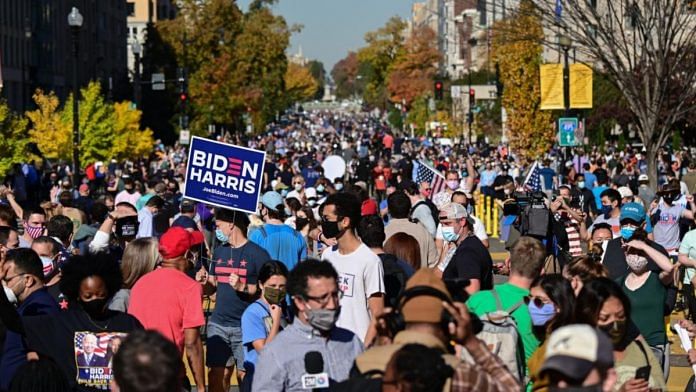Was last week’s U.S. presidential contest between Joe Biden and Donald Trump the first global election?
America’s presidential election has always attracted an outsized share of the world’s attention, of course, especially in recent years. Still, it is striking how much the entire planet seems to have taken part in both the proceedings and the reaction this year. Across Europe there have been church bells ringing, fireworks and celebrations, along with some degree of dismay. My friends there have e-mailed me with their opinions, congratulations and questions about what happens next.
Meanwhile the election of Kamala Harris as vice president has prompted celebrations in both India and Jamaica, the birthplaces of her mother and father, respectively. Other Indians rooted for Trump, in part because of his support of (and populist similarities with) Prime Minister Narendra Modi. If you think candidates with diverse ethnic backgrounds will only become more likely in the U.S. in the future, that too will help to keep the U.S. presidential election a global event.
Obviously Trump has been an unusual American president. He generated stronger emotions — pro and con — than his predecessors. Nonetheless, there are signs that the U.S. election is here to stay as a global phenomenon.
Social media are the main reason. People want common events to watch and argue over, and the U.S. presidential election has no close competitor. The contest for the presidency of the European Union, for instance, will not generate global interest anytime soon, nor will the one for general secretary of the Chinese Communist Party. There is also the World Cup and the Olympics and the Eurovision song contest — but for sheer drama, it will be hard to top the 2020 U.S. presidential election.
The Brexit vote and subsequent machinations in the U.K. and Europe come close. But that wasn’t quite a global event, generating far more debate and emotion in North America and Europe than in many emerging economies.
That suggests the notion of a global political election has some staying power — if the stakes are high enough. This is a world where #MeToo has come to Iran, and the Black Lives Matter movement is global. Probably because of social media, and the predominance of the English language on the internet, America is setting the agenda when it comes to ideas and debate.
One relatively recent difference in U.S. politics also helps to make the presidential election a global event: Congress used to have a larger say in foreign policy, but it has retreated from that role, thereby making the choice of president more important for the rest of the world. Even if you argue that America is no longer the uncontested global power it once was, it still matters a great deal who is president — especially when, as now, balances of power are shifting.
What kind of bargain is it for the country for the U.S. election to be the object of such global interest? We Americans may be flattered by the attention, but it is not clear that it is such a good thing. For one thing, it gives foreigners a greater incentive to try to manipulate U.S. elections.
Another possible problem is that political coalitions will, over time, be defined globally rather than nationally and locally. Is your presidential candidate attracting support from the wrong factions in France, Germany or South Sudan? On one hand that could be useful information, but it could also prove misleading. Foreigners support U.S. presidential candidates for their own reasons, and it could be distorting to have so many outside parties involved. That’s what happened in the Brexit debates, in which a pro-Brexit position was (and remains) all too quickly identified with populism, anti-globalization and support for Trump. The Brexit debate might have been more sane if it had been more local.
What if, come the next U.S. presidential election, most of the social media debate is among non-Americans? What if much of the world ends up with a common, one-dimensional political spectrum, rather than each country having its own (mostly) independent politics? We may be about to find out. – Bloomberg
Also read: Trump’s hurting himself and Biden during the transition



